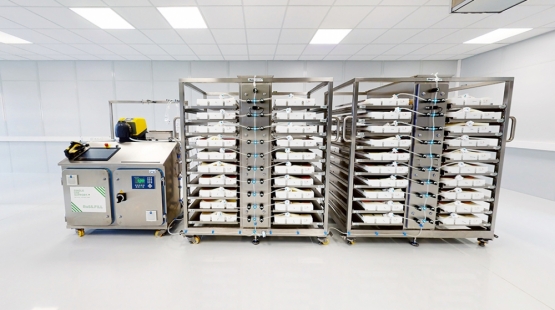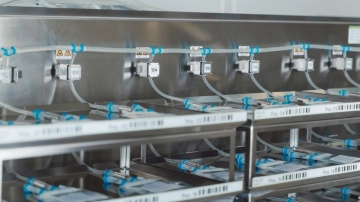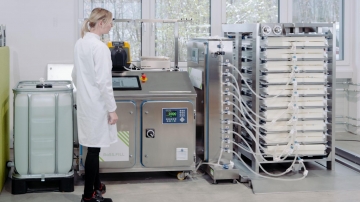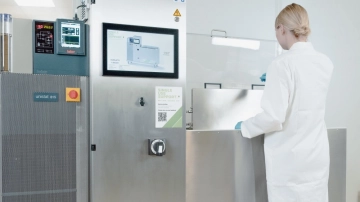Challenges in manufacturing biosimilars
Table of contents
ShowManufacturing biosimilars presents a lot of chances but also challenges for producers. Biosimilars have the potential to expand patient access to life-changing treatment options and present an alternative to brand-name biological therapeutics.
To tap into the full potential that the growing market for biosimilars is offering, it is essential for manufacturers to create efficient strategies for biosimilar production. Critical challenges in manufacturing biosimilars have to be addressed, including fluid and cold chain management, scale-up, and safe handling of biosimilars, all while balancing cost and time efficiency with regulatory compliance.
Manufacturing biosimilars — why it matters
The first biosimilar was approved in 2006 by the European Medicines Agency (Omnitrope). Since then, the U.S. followed suit in 2015 with the authorization of Zarxio, and the market size for biosimilars as well as the number of FDA-approved biosimilars have been constantly increasing. While the global market size was an estimated $24.9 billion in 2023, it is expected to reach $66.9 billion in 2028.
With demographic changes and a population that is growing older and older, it comes as no surprise that the demand for treatments for immune diseases and chronic illnesses is increasing. By joining the market of biologics, biosimilars broaden patient access to life-saving medicines. This becomes possible as soon as the patent for the reference drug has expired – a patent, though, that is necessary for the amortization of the high costs related to research and development.1 2
The typical manufacturing process for biosimilars
The manufacturing process for biosimilars starts with the characterization of the reference biologic to ensure their similarity in terms of efficacy and safety. The next stage is cell line development and cell culture, in which the desired proteins are grown with the help of bioengineering and multiplied in bioreactors.
Cells are purified, proteins are harvested and their similarity to the reference product established with the help of physiochemical, biological and functional characterization techniques.
Here is an overview of the different steps of the biomanufacturing process of biosimilars:
- Characterization of reference biologic
- Cell line development
- Cell culture
- Harvesting
- Purification
- Characterization
- Formulation
- Fill Finish
- Quality Control
- Packaging
Source:3
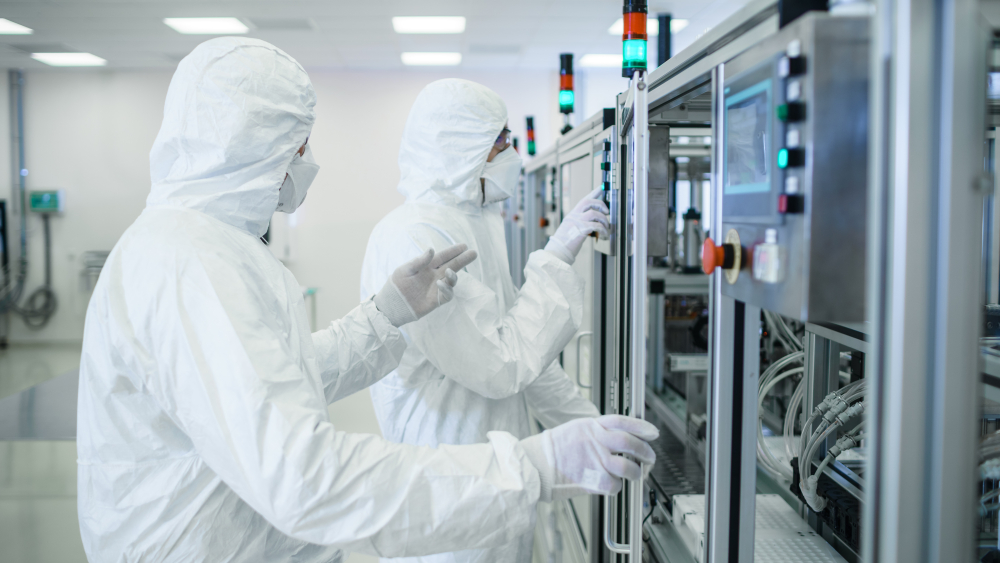
Challenges in manufacturing biosimilars
There are several challenges in manufacturing biosimilars producers have to face. Among those are efficient fluid and cold chain management, as well as scalability and safe handling practices. Also, as a constantly growing sector of the pharmaceutical industry, manufacturing biosimilars needs to be as efficient as possible without compromising the quality or safety of the product. With the help of innovative technology and automated solutions, this goal can be achieved.
Efficient fluid and cold chain management
Time is of the essence when it comes to manufacturing biosimilars. As the production process as a whole is a costly endeavor, process efficiency in biomanufacturing needs to be increased.
This risk is especially high during filling, transport and storage settings, where bioprocessing containers can easily get damaged when they are moved around or shipped to other manufacturing locations, as bag breakages can occur due to incorrect handling.
Another challenge is the continuation of the cold chain when handling biosimilar substances. Depending on the type of biosimilar product, it needs to be kept at specific temperatures for storage or transport to prevent any undesired product alterations. For instance, monoclonal antibodies and gene therapies require storage temperatures of -80 °C.
As reproducibility is key in biosimilar production to guarantee a safe product, reliable control and testing systems are needed to intervene in case of deviations. Therefore, it is important to develop streamlined manufacturing strategies to stay as time efficient as possible. With the help of closed automated systems, these hurdles can be overcome more easily.
Scale-up is one of the most challenging steps for many manufacturers because there are several difficulties connected with the production of larger batches. One of them is the need for appropriate equipment, as not every production site has the needed machines in different sizes at hand.
Also, limited space capacities for large bioreactors can present problems for manufacturers. In smaller and mid-range facilities, the investment in scale-up equipment is also often connected to the investment into larger production halls and the need for more staff. As statistics show, the latter is especially hard to come by.
Further, large-scale equipment is a costly investment. Not every production site has the resources to finance them and the willingness to put large capital expenditures in hand to keeping up with state-of-the-art manufacturing devices that are typically needed to stay competitive.
The ability to react to changing demands and move from small volumes to scale-up biosimilar production is key for manufacturers. With scalable single-use solutions for upstream to downstream bioprocessing, the gap between the development of biosimilars and their manufacturing can be filled.
Scaling up biosimilar production
Scale-up is one of the most challenging steps for many manufacturers because there are several difficulties connected with the production of larger batches. One of them is the need for appropriate equipment, as not every production site has the needed machines in different sizes at hand.
Also, limited space capacities for large bioreactors can present problems for manufacturers. In smaller and mid-range facilities, the investment in scale-up equipment is also often connected to the investment into larger production halls and the need for more staff. As statistics show, the latter is especially hard to come by.
Further, large-scale equipment is a costly investment. Not every production site has the resources to finance them and the willingness to put large capital expenditures in hand to keeping up with state-of-the-art manufacturing devices that are typically needed to stay competitive.
The ability to react to changing demands and move from small volumes to scale-up biosimilar production is key for manufacturers. With scalable single-use solutions for upstream to downstream bioprocessing, the gap between the development of biosimilars and their manufacturing can be filled.4 5
Safe handling in biosimilar manufacturing
The safe handling of biological materials during bioprocessing is subject to continuous changes in regulatory requirements due to new advances in biotechnology and the discovery of new therapeutics. For example, EU GMP Annex 1, one of the largest recent updates to cleanroom and sterile manufacturing requirements, touches on fluid management for biopharmaceutical products.
Reacting to changes in the regulatory framework concerning the safe handling of biosimilars poses a big challenge on manufacturers. In order to comply with requirements like PUPSIT (pre-use post-sterilization test) for sterile filters, manufacturing facilities rely on state-of-the-art equipment that makes their job easier.
Apart from regulations that are set out to guarantee the quality and safety of a product, precautions are needed to protect workers when handling hazardous drug substance components, as is the case in the manufacturing of antibody drug conjugates (ADCs).
Contamination risks and product loss can be significantly reduced by integrating automation into the process. And in addition, the minimized need for human intervention relieves staff from monotonous or even dangerous tasks.
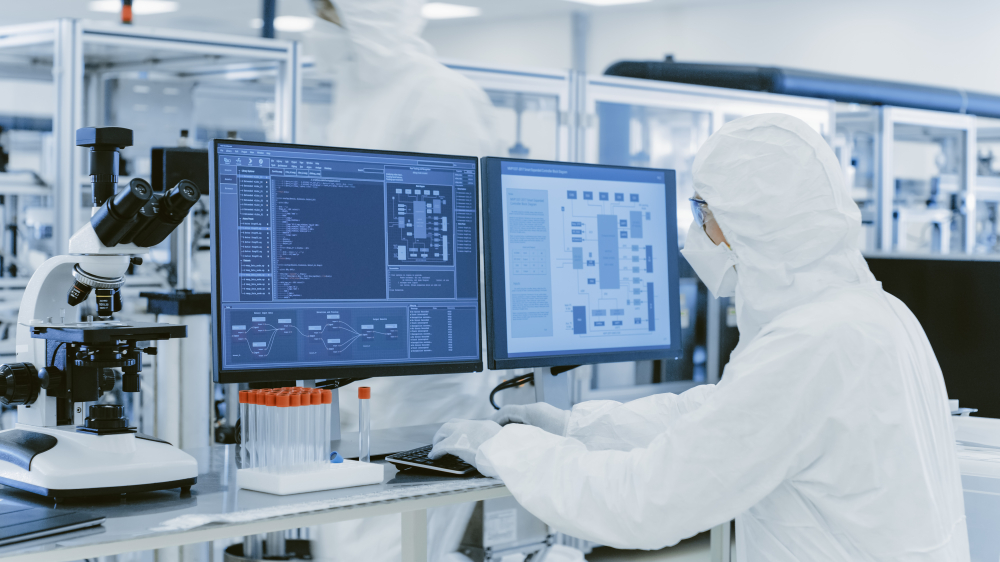
Mastering production challenges with Single Use Support
Optimized biosimilar manufacturing should combine high quality, compliance with regulatory standards, and efficiency. To reach this balance, manufacturers can rely on automated single-use technologies that make it easier to monitor the whole process, react quickly if adjustments are needed, and to boost production times significantly.
Innovative solutions are needed to close technological gaps in fluid management for biosimilar production. To bring cutting-edge automated solutions to the table, Single Use Support has developed RoSS.FILL, an automated fill and filtration system that is able to fill multiple single-use bags and bottles with up to 300 litres per hour. Multiple racks can easily be attached.
To guarantee best results and even protein distribution, solutions in single-use bags are homogenized with RoSS.PADL.
Scalability is also one of the most important features of Single Use Support’s modular fluid and cold chain management solutions. This includes RoSS.pFTU, an automated plate freezing platform that can be scaled up to 400 litres or more for each batch. In combination with single-use bags, covered in RoSS® Shell as a protective packaging, or bioprocess containers by other manufacturers, the system allows for homogenous freeze-thaw processes for biosimilars with controlled cooling rates down to -80°C. And should even lower temperatures be required, the cryogenic freezer RoSS.LN2F is ready for controlled cryogenic freezing of biosimilars to temperatures as low as -170°C.
For the safe storage of biologics and biosimilars, Single Use Support’s ultra-cold storage freezer RoSS.FRDG keeps solutions cool at temperatures down to -75 °C. Additionally, the smart cold chain shipping container RoSS.SHIP allows for an uninterrupted cold chain during transport. These cold chain shipping containers are trackable, coolable and robust to guarantee that biosimilar products reach their destination safely. It holds up to 55 single-use bags protected in the RoSS® shell to make shipping drug substances most efficient for manufacturers.
To sum up: The challenges in biosimilar manufacturing are manifold, but can be mastered with the help of innovative single-use solutions. Single Use Support provides manufacturers with new systems that help streamline the production process to improve safety and efficiency.
- Expected Impact of Biosimilars on the Pharmaceutical Companies, https://doi.org/10.30476/ijms.2021.92314.2356, Published 1970-01-01
- “Biosimilars market by drug class”. Markets and Markets, https://www.marketsandmarkets.com/Market-Reports/biosimilars-40.html#:~:text=The%20global%20biosimilars%20market%20in,17.8%25%20from%202023%20to%202028, Published 03.05.2024
- Developments and opportunities in continuous biopharmaceutical manufacturing, http://dx.doi.org/10.1080/19420862.2021.1903664, Published 2021-04-11
- Staffing Shortages: Major Hurdle for Bioprocess Contract Manufacturing Services in 2023, https://www.pharmtech.com/view/staffing-shortages-major-hurdle-for-bioprocess-contract-manufacturing-services-in-2023, Published 08.2023
- A look into biologic scale-up strategies, https://www.biopharminternational.com/view/a-look-into-biologic-scale-up-strategies, Published 08.2023



